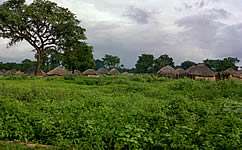Bushmeat a safety net for West African farmers

Cocoa farmers in West Africa are using bushmeat as a back-up source of food and income in times of hardship, according to new research.
The study, published in PLOS One, says conservation measures that restrict access to bushmeat through hunting bans and law enforcement may damage the livelihoods of rural communities.
'When rural societies move towards intensive cash cropping, they tend to damage ecosystems,' says Dr Björn Schulte-Herbrüggen, who led the research.
'But it's important to remember that rural communities rely on those ecosystems for income and food.'
'If we want to protect both wildlife and the livelihoods of these communities, they need to gain access to new and more diverse sources of income during the agricultural lean season.'
Across the tropical belt of Central Africa, bushmeat is often the main source of animal protein. But in West Africa, rural areas are more densely populated and economically developed.
It wasn't clear how important bushmeat is to those farming communities, many of which live in landscapes that have seen dramatic losses in wildlife from over-hunting.
Schulte-Herbrüggen spent nearly two years living with cocoa farming communities in Ghana, where he carried out 787 interviews, covering 63 households.
'This study is a very important part of my life,' he says. 'Poverty is a very nasty thing and when you live and work with people who experience it in that way, it has a very big impact on you.'
Larger species like elephants and antelope have long disappeared from the landscape. In some parts of Africa, primates are a common source of protein, but throughout his time in Ghana, Schulte-Herbrüggen saw only one primate harvested for meat.
Instead, when times get tough, the locals have been left to fall back on smaller, faster-reproducing animals like rats. But the tightly-packed canopies of cocoa farms that dominate the landscape leave little habitat for even the hardiest of species.
Schulte-Herbrüggen and his team fear that this pattern could be repeated across the developing economies of central and western Africa, creating a tension between protecting wildlife and sustaining the development of rural communities.
They suggest that diversifying the sources of income available to those communities during the agricultural lean season could help to relieve their dependency on bushmeat as a safety net.
This, they argue, could make it easier to set apart land for protection from hunting, without damaging the livelihoods of rural people.
Schulte-Herbrüggen is now based at the Stockholm Resilience Centre at Stockholm University. At the time of the study he was based at University College London and the Zoological Society of London.
Journal information: PLoS ONE
Provided by PlanetEarth Online
This story is republished courtesy of Planet Earth online, a free, companion website to the award-winning magazine Planet Earth published and funded by the Natural Environment Research Council (NERC).


















